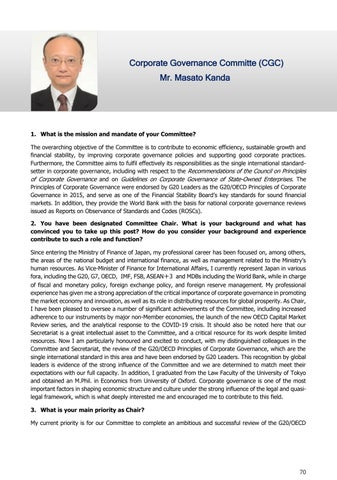Corporate Governance Committe (CGC) Mr. Masato Kanda
1. What is the mission and mandate of your Committee? The overarching objective of the Committee is to contribute to economic efficiency, sustainable growth and financial stability, by improving corporate governance policies and supporting good corporate practices. Furthermore, the Committee aims to fulfil effectively its responsibilities as the single international standardsetter in corporate governance, including with respect to the Recommendations of the Council on Principles of Corporate Governance and on Guidelines on Corporate Governance of State-Owned Enterprises. The Principles of Corporate Governance were endorsed by G20 Leaders as the G20/OECD Principles of Corporate Governance in 2015, and serve as one of the Financial Stability Board’s key standards for sound financial markets. In addition, they provide the World Bank with the basis for national corporate governance reviews issued as Reports on Observance of Standards and Codes (ROSCs). 2. You have been designated Committee Chair. What is your background and what has convinced you to take up this post? How do you consider your background and experience contribute to such a role and function? Since entering the Ministry of Finance of Japan, my professional career has been focused on, among others, the areas of the national budget and international finance, as well as management related to the Ministry’s human resources. As Vice-Minister of Finance for International Affairs, I currently represent Japan in various fora, including the G20, G7, OECD, IMF, FSB, ASEAN+3 and MDBs including the World Bank, while in charge of fiscal and monetary policy, foreign exchange policy, and foreign reserve management. My professional experience has given me a strong appreciation of the critical importance of corporate governance in promoting the market economy and innovation, as well as its role in distributing resources for global prosperity. As Chair, I have been pleased to oversee a number of significant achievements of the Committee, including increased adherence to our instruments by major non-Member economies, the launch of the new OECD Capital Market Review series, and the analytical response to the COVID-19 crisis. It should also be noted here that our Secretariat is a great intellectual asset to the Committee, and a critical resource for its work despite limited resources. Now I am particularly honoured and excited to conduct, with my distinguished colleagues in the Committee and Secretariat, the review of the G20/OECD Principles of Corporate Governance, which are the single international standard in this area and have been endorsed by G20 Leaders. This recognition by global leaders is evidence of the strong influence of the Committee and we are determined to match meet their expectations with our full capacity. In addition, I graduated from the Law Faculty of the University of Tokyo and obtained an M.Phil. in Economics from University of Oxford. Corporate governance is one of the most important factors in shaping economic structure and culture under the strong influence of the legal and quasilegal framework, which is what deeply interested me and encouraged me to contribute to this field. 3. What is your main priority as Chair? My current priority is for our Committee to complete an ambitious and successful review of the G20/OECD
70
















